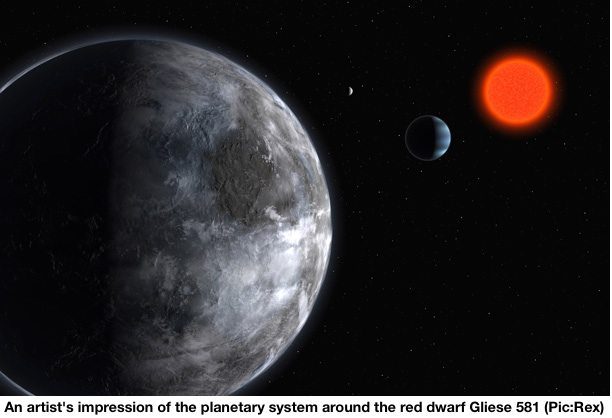An international team of scientists has discovered a potentially habitable super-Earth orbiting a nearby star.
With an orbital period of about 28 days and a minimum mass 4.5 times that of the Earth, the planet orbits within the star’s “habitable zone,” where temperatures are neither too hot nor too cold for liquid water to exist on the planet’s surface. The researchers found evidence of at least one and possibly two or three additional planets orbiting the star, which is about 22 light-years from Earth.
The team includes UC Santa Cruz astronomers Steven Vogt and Eugenio Rivera and was led by Guillem Anglada-Escudé and Paul Butler of the Carnegie Institution for Science.
“This planet is the new best candidate to support liquid water and, perhaps, life as we know it,” Anglada-Escudé said.

The host star is a member of a triple-star system and has a different makeup than our Sun, with a much lower abundance of elements heavier than helium, such as iron, carbon, and silicon. This discovery indicates that potentially habitable planets can occur in a greater variety of environments than previously believed.
The researchers used public data from the European Southern Observatory and analyzed it with a novel data-analysis method. They also incorporated new measurements from the W. M. Keck Observatory’s High Resolution Echelle Spectrograph and the new Carnegie Planet Finder Spectrograph at the Magellan II Telescope. Their planet-finding technique involved measuring the small wobbles in a star’s motion caused by the gravitational tug of a planet.
“This was expected to be a rather unlikely star to host planets. Yet there they are, around a very nearby, metal-poor example of the most common type of star in our galaxy,” said Vogt, a professor of astronomy and astrophysics at UCSC. “The detection of this planet, this nearby and this soon, implies that our galaxy must be teeming with billions of potentially habitable rocky planets.”
Source: aas.org

The aim of art is to represent not the outward appearance of things, but their inward significance. – Aristotle














